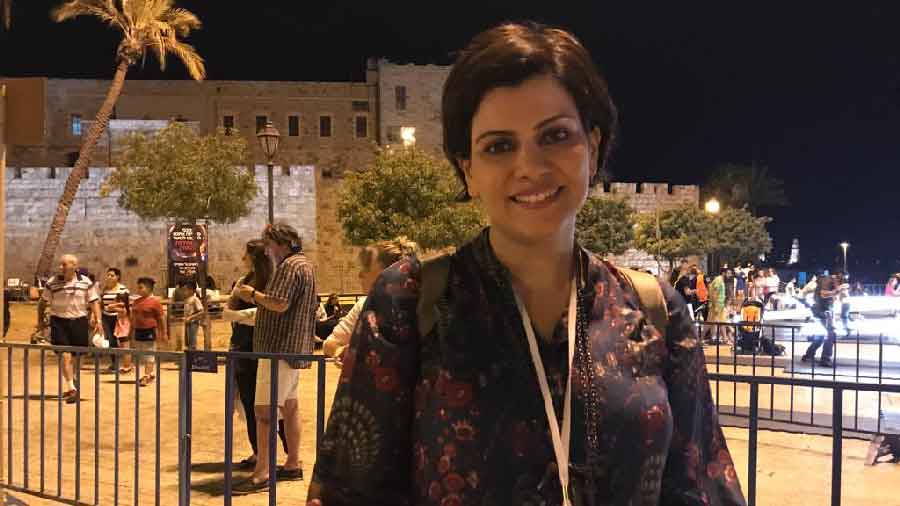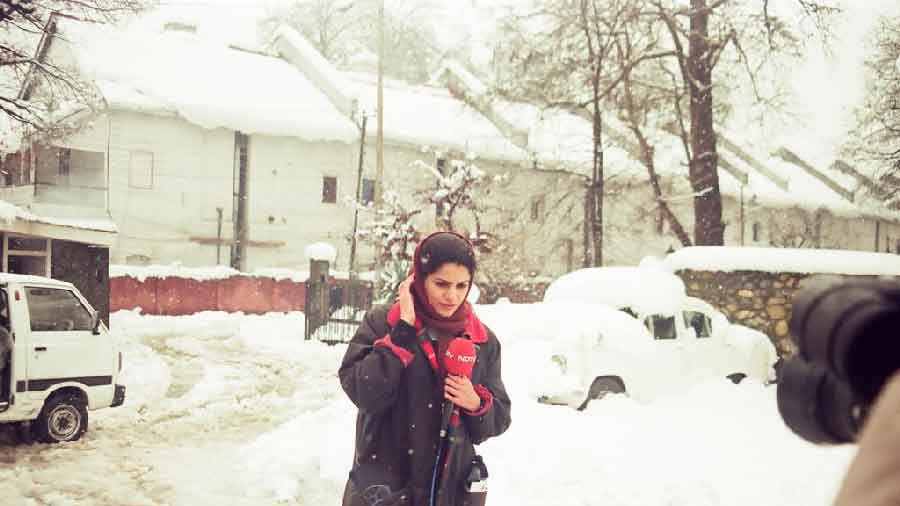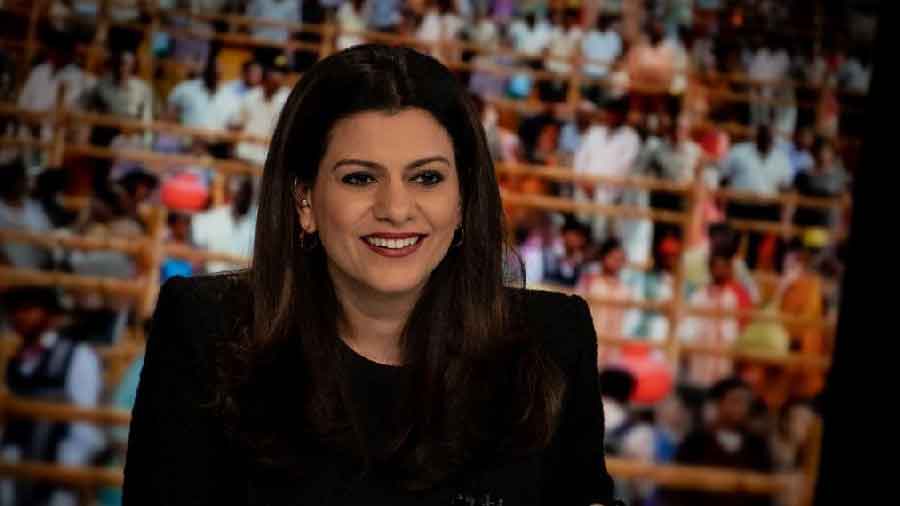What you see is what you get. That’s obvious the moment I sit down across from star anchor Nidhi Razdan. Every hair is perfectly in place and she could begin reading the news or compering a current events show at a moment’s notice.
Razdan has been a familiar face on our screens for as long as most of us can remember. She’s also interviewed almost everyone who is anyone in Indian politics and global leaders like former British Prime Minister David Cameron. Some interviews have ended in high drama like the time she ordered BJP spokesman Sambit Patra off her show. She points out that former President Pranab Mukherjee also once stormed out during a live broadcast, but quickly calmed down and apologised for losing his temper. For the BJP, she will never be one of their favourite newscasters.
There’s a bright side and a grimmer side to Razdan’s career. At one level, she joined NDTV in 1999 and has stuck on there for 23 years with one brief break last year. She says bluntly: “For me, it’s home. I couldn’t have imagined working anywhere all these years.” In the glory days back when the channel was flush with funds, she was sent to London to cover the 2005 bomb attacks. She even made it to Tibet and went several times to Pakistan. One documentary on POK was runner-up at the Asian TV awards.

In Israel covering Prime Minister Modi's visit in 2017
Still, Razdan’s the first to admit it isn’t easy to be a woman anchor in our age of deeply divided and polarised political opinions. She has 995,000 Twitter followers but hardly ever posts on social media because even the mildest comment can attract a torrent of troll abuse. One study calculated she’s the third most attacked woman journalist after Rana Ayyub, who is hated by Hindutva trolls, and former colleague Barkha Dutt. Says Razdan: “I don’t like social media. It’s a poisonous place.” She adds: “The only reason I’m on Twitter is because otherwise people were impersonating me, which is worse.”
That’s a grim commentary on the times we live in and she’s the first to admit there’s a negative side to being a high-profile newscaster. The extraordinary lengths to which her faceless enemies were willing to go burst into the open after her bizarre experience of a job offer that appeared to come from Harvard University.
The perpetrators, she says, forged university letterheads and conducted interviews with her boss Prannoy Roy and colleague Sonia Singh. The elaborate fraud became the subject of a detailed New York Times investigation. She says: “One had conversations and e-mail exchanges with people. They had stolen documents from the university and forged signatures.” She speculates that she may have been the target of a foreign government and adds: “It seemed to be aimed more towards surveillance than anything else. There was malware on my laptop and other devices.”
She quit NDTV briefly in 2020 when it looked like the Harvard job was in the bag but returned to the channel in February though on a looser contract where she only works four days and gets a three-day weekend. That enables her to spend more time with her mother who is unwell – and also her four dogs which include a golden retriever, a Labrador and a cocker spaniel.
She says: “I asked for more work-life balance, because I realised during Covid that there's more to life than working five days a week, 20 hours a day. So I do a four day week and I'm much happier.”
Becoming a journalist was perhaps always on the cards for Razdan. Her father M. K. Razdan was the Press Trust of India’s chief editor and CEO for a long stretch and news was always a way of life at home. Says Razdan: “I was interested in news because that was just the way we grew up. Watching the news at night was compulsory and reading newspapers was supposed to be as important as brushing your teeth every morning.” She adds: “I just wanted to be a part of that.”
But there was a catch. She didn’t want to be following in her father’s footsteps too closely and didn’t want him using his influence on her behalf to get a job. Her mother smartly suggested that TV was the new emerging medium and it would be far removed from what her father was doing. TV would also allow her to use her public speaking skills that she had developed at the Lady Shriram College debating society. Says Razdan: “My dad is my idol but I wanted to do something different from him.” Always the highflyer, she graduated top of her class at the Indian Institute of Mass Communication.
Soon afterwards she applied to NDTV but was turned down even for an internship. “I was told we don’t take interns.” It was a rejection that may still rankle deep down: “I was turned away when I first went. I won’t name the person who did that. But he knows who he is,” she says half-humorously, half-darkly.
NDTV in those days was a smaller outfit than it is today and there were plenty of opportunities for the young new recruit to earn her stripes. Razdan has high praise for fellow newscaster Rajdeep Sardesai, who gave her and the rest of the team plenty of chances to work on all big stories and even fixed appointments for them with senior politicians.
Barely three months after joining, Razdan was dispatched to do the morning parliament broadcast on her own. “I got really scared and he said, ‘Just read the newspaper’. He literally threw me in at the deep end.” Razdan ended up doing a lot of political reporting and also covering the External Affairs beat. Mukherjee walked off her show when she threw in a question about sanctions on Iran during what he expected to be an interview focusing on Saarc, the South Asia regional body.

Reporting from Kashmir a long time ago
Working at NDTV had other benefits for a woman. Razdan says she has hardly ever had to face discrimination because she was a woman. “I came from a place of privilege because, at NDTV, we’ve had the reverse problem at times and had primetime dominated by women. There was a point when I was doing eight o'clock, Sonia (Singh) was doing nine o'clock and Barkha (Dutt) was doing 10 o'clock.”
Similarly, she points out the External Ministry beat was dominated by women like The Hindu’s Suhasini Haidar, NDTV’s Maya Mirchandani and The Times of India’s Indrani Bagchi. Razdan was NDTV’s executive editor till 2020. Today, she does the 7pm news and another prime time show No Spin four days a week and another digital programme Hot Mic, which four times weekly goes deeper into the issues of the day. That’s quite a jam-packed schedule for someone working four days a week. She usually works about eight hours daily in office and closes her shows and heads home around 10pm.
In recent times, however, the newsroom atmosphere has turned grimmer. NDTV has been more strapped for cash in recent years and it very definitely is not the government’s favourite channel. Says Razdan: “NDTV is surviving the storms. There are forces at play that would like nothing better than to see the channel shut down. There are so many constraints that we didn’t have 10-15 years ago. But we’re surviving and pushing back and asking the right questions.”
There are other downsides to being a high-profile media player. Razdan reckons she must assume that she’s always under surveillance in one way or another. She says: “I’ve come to assume they can listen to what they want. It’s wrong and you feel completely violated by it. But it’s the reality of the times we live in.”
But journalism has been forced to change in recent years and the concept of objectivity which was sacred to the press has had to take on a new meaning, she argues. “The traditional definition of objectivity doesn’t exist anymore.” Giving an example, she says: “If somebody is lynched for some meat they have in their fridge, I don't know what the other side of that story is. There is only one side.” She adds: “When you see constitutional values being eroded. You just have to take a stand and push back on that as a media organisation. Some stories just don't have another side.” She laments the fact that the Indian media hasn’t been so energetic in calling out the government and fact-checking its claims as the US media did so vigorously with President Donald Trump.
With the media scene looking bleak, how does she believe the future will unfold? She insists she would like to continue being a journalist, “I think once you’re a journalist, you’re a journalist for life.” But she’s become more philosophical after two years of living with Covid-19, and says: “After Covid and all the rest of it, I think one should just take life as it comes. Literally one day at a time.”











